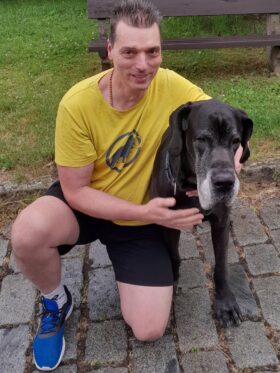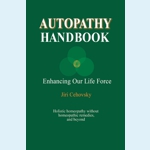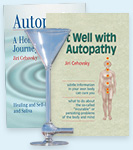If you want a healthy dog…
 Shortly after I got my current dog, a black Great Dane, it was obvious that he was not going to have a long, nor pleasant and healthy life. This was an unacceptable notion for me. Therefore I decided in the first place to take him to the vet only in case of absolute necessity – simply according to the motto “if you want a healthy dog, don’t take him to the vet” (a similar lesson applies to humans, but that doesn’t belong here). These days he “celebrates” nine years of age in better health than when he was as a small puppy (the average life expectancy of Great Danes is currently under 6 years).
Shortly after I got my current dog, a black Great Dane, it was obvious that he was not going to have a long, nor pleasant and healthy life. This was an unacceptable notion for me. Therefore I decided in the first place to take him to the vet only in case of absolute necessity – simply according to the motto “if you want a healthy dog, don’t take him to the vet” (a similar lesson applies to humans, but that doesn’t belong here). These days he “celebrates” nine years of age in better health than when he was as a small puppy (the average life expectancy of Great Danes is currently under 6 years).
Already as a puppy he suffered from diarrhea. Very frequent, often bloody. It was neither an infection nor parasitosis, but an autoimmune inflammation of the gut – something like Crohn’s disease/ulcerative colitis, but in a dog. In such a giant breed, this is a disaster because due to the inflammation in the intestine, he is unable to absorb enough nutrients and growth disturbances manifest. In his case, the hip joints have developed badly. So, from a young age, it was obvious that his hips were hurting – he was limping and it limited him in some movements (Sit!).
Pulsatilla was given as the first treatment (extremely affectionate, greatly aggravated by heat, greatly improved by fresh air, drank extremely little). Pulsatilla improved his condition by a good 70%, but not completely. It should have been applied again, but there were no longer significant symptoms. And so took out the precious autopathic bottle … a few applications of a preparation from boiled saliva concluded the case and since then I haven’t known what a diarrhea in a dog is.
As for his hips and their pain – without targeting this problem in any way directly, with the autopathic treatment given for various minor things, these problems gradually got better, until they gradually disappeared, and for the last few years they have obviously not been causing him any more problems.
As a puppy, he had problems with the Harderian gland in his right eye. Surgery in which the gland is removed was the only option. But contrary to the vet’s assurances, at the age of 4 he went blind on this eye. The cornea in the eye gradually turned brown until it turned completely black.
Then he developed an ulcer on his back leg. It was inflamed and purulent at first, so I immediately started with autopathy with boiling. The ulcer calmed down, the infection disappeared and slowly started to heal – but Sherpa kept licking and biting it, and so the healing took a long time. Eventually the wound healed, but he was left with a scar of new pink skin on his leg, about 5 cm in diameter.
In 2022, he gradually went blind in his left, previously healthy eye. A cataract developed in it, which quite quickly robbed him of his sight. I used an experimental method of autopathy out of earwax to treat him. A rather dramatic course of treatment followed, but after about 2 months the cataract cleared completely and he can see normally again. Furthermore, even the cloudy cornea in his right eye has cleared to some extent, so that he can partially see again, even on this eye which had been blind for many years.
But the most interesting thing about this treatment was that the ulcer, so laboriously healed before with boiled saliva, suddenly “woke up” again, the laboriously created new pink skin died off (and Sherpa immediately bit it out and licked it), the ulcer opened up only to very quickly heal again (this time with complete disinterest from the dog). And in the place of the ulcer a healthy, strong black skin formed and even grew hair again! And so right now you can’t even tell where the ulcer was. If I hadn’t seen it with my own eyes, I would have said that it was impossible…
So, to recap:
Autoimmune inflammatory bowel disease – at the vet’s it would probably mean a lifetime of corticosteroids with poor efficacy.
Hip pain – vets deal with it by giving joint nutrition, analgesics, corticosteroids (how else) and ultimately surgery. Evidently it can be done without chemical drugs.
Ulcers – antibiotics and corticosteroids, which usually don’t help much (well, not the dog, the vet very much).
Cataracts – the general solution at the vet is a helpless shrug of the shoulders “the dog doesn’t need eyes anyway, his nose is enough”. Yes, they handle it surgically now, as they do with humans, but generally no solution is searched for.
I don’t want it to look like that I’m fanatically dismissing veterinary care – if the dog has a gastric torsion or gets hit by a car, the vet will of course deal with it. But the fewer things that are dealt with chemically, the better the health and even longer life expectancy that can be expected for the dog.



